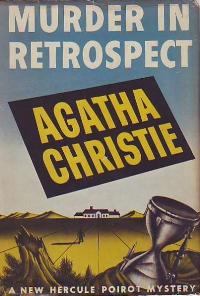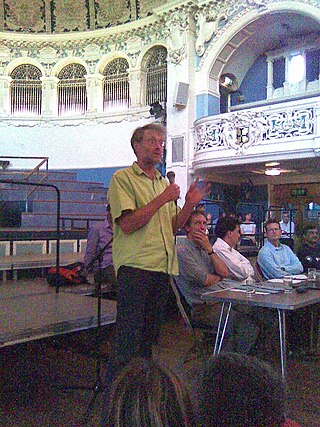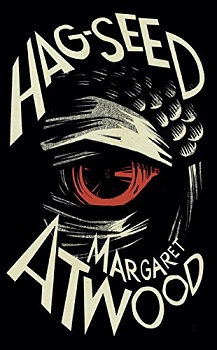
Death in the Clouds is a work of detective fiction by British writer Agatha Christie, published in 1935. It features the Belgian detective Hercule Poirot and Chief Inspector Japp. It is a "closed circle" murder mystery: the victim is a passenger on a cross-Channel aircraft flight, and the perpetrator can only be one of eleven fellow-passengers and crew.
Metafiction is a form of fiction that emphasizes its own narrative structure in a way that inherently reminds the audience that they are reading or viewing a fictional work. Metafiction is self-conscious about language, literary form, and story-telling, and works of metafiction directly or indirectly draw attention to their status as artifacts. Metafiction is frequently used as a form of parody or a tool to undermine literary conventions and explore the relationship between literature and reality, life, and art.

Thomas Tickell was a minor English poet and man of letters.

The Secret Adversary is the second published detective fiction novel by British writer Agatha Christie, first published in January 1922 in the United Kingdom by The Bodley Head and in the United States by Dodd, Mead and Company later in that same year. The UK edition retailed at seven shillings and sixpence (7/6) and the US edition at $1.75.

Edmond Dantès is a title character, Byronic hero and the protagonist of Alexandre Dumas's 1844 adventure novel The Count of Monte Cristo. Within the story's narrative, Dantès is an intelligent, honest and loving man who turns bitter and vengeful after he is framed for a crime he did not commit. When Dantès finds himself free and enormously wealthy, he takes it upon himself to reward those who have helped him in his plight and punish those responsible for his years of suffering. He is known by the aliases The Count of Monte Cristo, Abbé Busoni,Lord Wilmore, and Sinbad the Sailor.

Five Little Pigs is a work of detective fiction by British writer Agatha Christie, first published in the US by Dodd, Mead and Company in May 1942 under the title Murder in Retrospect and in the UK by the Collins Crime Club in January 1943. The UK first edition carries a copyright date of 1942 and retailed at eight shillings while the US edition was priced at $2.00.

Luke Michael Haines is an English musician, songwriter and author. He has recorded music under various names and with various bands, including The Auteurs, Baader Meinhof and Black Box Recorder.
Bryan Stanley William Johnson was an English experimental novelist, poet and literary critic. He also produced television programmes and made films.

Mattia Sbragia is an Italian character actor.

Three Act Tragedy is a work of detective fiction by British writer Agatha Christie, first published in the United States by Dodd, Mead and Company in 1934 under the title Murder in Three Acts and in the UK by the Collins Crime Club in January 1935 under Christie's original title. The US edition retailed at $2.00 and the UK edition at seven shillings and sixpence (7/6).

Dumb Witness is a detective fiction novel by British writer Agatha Christie, first published in the UK by the Collins Crime Club on 5 July 1937 and in the US by Dodd, Mead and Company later in the same year under the title of Poirot Loses a Client. The UK edition retailed at seven shillings and sixpence (7/6) and the US edition at $2.00.

The Pale Horse is a work of detective fiction by British writer Agatha Christie, first published in the UK by the Collins Crime Club on 6 November 1961, and in the US by Dodd, Mead and Company the following year. The UK edition retailed at fifteen shillings and the US edition at $3.75. The novel features her novelist detective Ariadne Oliver as a minor character, and reflects in tone the supernatural novels of Dennis Wheatley who was then at the height of his popularity. The Pale Horse is mentioned in Revelation 6:8, where it is ridden by Death.

Passenger to Frankfurt: An Extravaganza is a spy novel by Agatha Christie first published in the United Kingdom by the Collins Crime Club in September 1970 and in the United States by Dodd, Mead and Company later in the same year. The UK edition retailed at twenty-five shillings. In preparation for decimalisation on 15 February 1971, it was concurrently priced on the dustjacket at £1.25. The US edition retailed at $5.95.

Christie Malry's Own Double Entry by Luke Haines is the soundtrack to the film of the same name, based on a novel by B. S. Johnson and directed by Paul Tickell. The album includes a cover of the Nick Lowe song "I Love the Sound of Breaking Glass" from Lowe's Jesus of Cool album.

Oliver Tickell is a British journalist, author and campaigner on health and environment issues, and author of the book Kyoto2 which sets out a blueprint for effective global climate governance. His articles have been published in all the broadsheet newspapers and numerous magazines including New Scientist, New Statesman and The Economist. He is an experienced broadcaster on the BBC home and world services including "Today", "PM", "Costing the Earth", "Farming World" and "Farming Today". He studied physics at Oxford University and is a founding fellow of the Green Economic Institute.

"I Love the Sound of Breaking Glass" is a song written by Nick Lowe, Andrew Bodnar, and Steve Goulding and performed by Lowe. It reached number 7 on the UK Singles in 1978. The song was featured on his 1978 album, Jesus of Cool.
Simon Bent is a British screenwriter and playwright, notable for work including BBC TV drama Beau Brummell: This Charming Man (2006), the screenplay for the feature film Christie Malry's Own Double-Entry (2000), and the Joe Orton biographical play Prick Up Your Ears based on John Lahr's book.

The history of accounting or accountancy can be traced to ancient civilizations.

Hag-Seed is a novel by Canadian writer Margaret Atwood, published in October 2016. A modern retelling of William Shakespeare's The Tempest, the novel was commissioned by Random House as part of its Hogarth Shakespeare series.
Christie Malry's Own Double-Entry is a 2000 film directed by Paul Tickell from a screenplay by Simon Bent, based on the 1973 novel of the same name by B. S. Johnson.
















